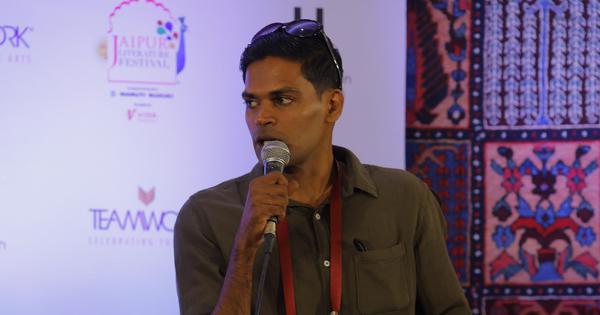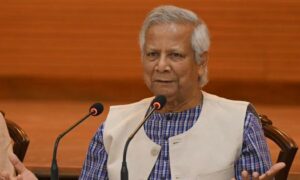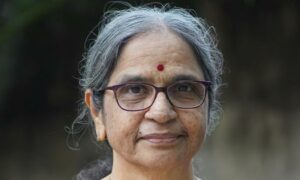
Saharu Nusaiba Kannanari’s much-awaited second novel to be published, The Menon Investigation, has arrived at bookstores a year and a half after his audacious debut, Chronicle of an Hour and a Half. Hailed as one of the best of the year, Kannanari’s first published novel was not just a hit amongst readers but also lauded by prize juries for its literary merit. Kannanari already has a distinct voice, full of wit and anger, moulded by years of reading illustrious writers. In a conversation with Scroll, he admitted to being a “great admirer of 20th-century American literature,” a reverence that manifests itself in his writing.
Smelling out crime
Kannanari has a nose for crime – or at least, the making of it. He is interested in the bits and the pieces, the nightmares and foiled dreams, the neglect and indignity that birth a criminal. Almost always, the individual is coerced and thwarted by the system, pushed into a corner with no exit route – compounding symptoms resulting in lifelong malaise. In The Menon Investigation, Kannari conducts two parallel investigations: of the criminal and the guardian of law.
IG Vijay Menon is reinvestigating the death of Kannan Moses, a colleague who was brutally murdered and set on fire at a beach near Kozhikode. The murder is committed by a gang, but the strings are being pulled by a nameless voice. Plainly put, it’s a case of contract killing. The mysterious circumstances of Moses’s death and a hurried closure of the case raise suspicion, and Menon is eager to get to the root of it for once and all.
“Dark Menon”, as he is often taunted, Vijay is a man of diminished quality. Kannanari describes him as a “tragic man”: a vegetarian with piles, a man suffering from erectile dysfunction despite having a healthy lifestyle, an upper-caste man with dark skin. The shame of dark skin follows him well into adulthood, convincing him that his younger daughter Roxanne too is a victim of the dark complexion she has inherited from her father. An angsty teenager, Vijay suspects her rebellion stems from an inferiority complex. In a family of three women (his daughters Kalyani and Roxanne and wife Padmini), he often feels sidelined. The three women have formidable minds and temper, with no real need for Vijay. He worries about the investigation during the day and, when at home, frets over his various ailments – physical and emotional.
The original sin
When the investigation is reopened, it is not just a police officer’s murder that undergoes renewed scrutiny. Decades-old cases open, including a communist’s encounter and the church’s nefarious presence in Adivasi lands. In these converted Christian communities, caste continues to cast its long shadow – the darkness festering personal enmity and state-sanctioned violence. With ancient secrets tumbling out with ease, Vijay is forced to confront his own biases about identity – an urgent reckoning brought about by his elder daughter and her lower-caste, dark-skinned boyfriend.
Quite rightly, the novel pronounces caste as the “nation’s central quarrel,” its “original sin”, and exposes its malignant impact on every layer of society. The holy trinity of the State – law, justice, and politics – is its most ruthless perpetrator, penalising even the smallest act of transgression. This parasitic nexus, guarded by upper caste, upper class elites, demands sacrifices to stay alive. There is nothing bigger than the State of the rich man’s creation, and here, no crime is sinful or morally wrong.
Kannanari’s focus is on intergenerational trauma that sours and ripens over the years. He’s interested in the interpersonal micro-aggressions in seemingly normal families and the misery of a lowly birth in otherwise happy homes. Caste continues to be a persistent nuisance even in the progressive, communist state of Kerala – a testament not so much to the failure of leftist politics but India’s lifelong obsession with caste purity.
The order, the novel argues, can rarely be subverted. Each of us gives in when rebellion becomes inconvenient and impossible. And the world continues to turn – undisturbed, on the same axis.
The Menon Investigation is intelligent and true – though, at times, a bit too clever. Vijay’s inner world occupies the first half of the novel, resulting in a sluggish entry into the heart of the investigation. The Prologue – atmospheric and chilling – pumps up the reader but the heat dissipates with the delayed reintroduction of Moses.
The novel picks up pace once more somewhere after the halfway mark, the revelations sending both Vijay and the reader into a tizzy. After a point, however, it gets tiring to read about Vijay’s nether regions (and their wide-ranging inadequacies) – I would have liked to know more about his relationship with his daughters, especially Kalyani, who is a timid presence despite the drama she’s forced into. The Epilogue, at nine pages long, is a disquieting conclusion to Moses and his killer’s story – both entwined in a doomed life and death, and the inescapable destinies of their identities.
Between the two, Chronicle remains my favourite, a debut novel that exhibited restraint and pluck, solemness and cheek, and is a masterful rendition of contemporary India’s oft-committed horror. Still, The Menon Investigation, despite minor complaints, indisputably establishes Kannanari as one of our most promising literary voices – he has spunk and style, and most importantly, the confidence to keep going.
The Menon Investigation, Saharu Nusaiba Kannanari, Penguin India.
📰 Crime Today News is proudly sponsored by DRYFRUIT & CO – A Brand by eFabby Global LLC
Design & Developed by Yes Mom Hosting






